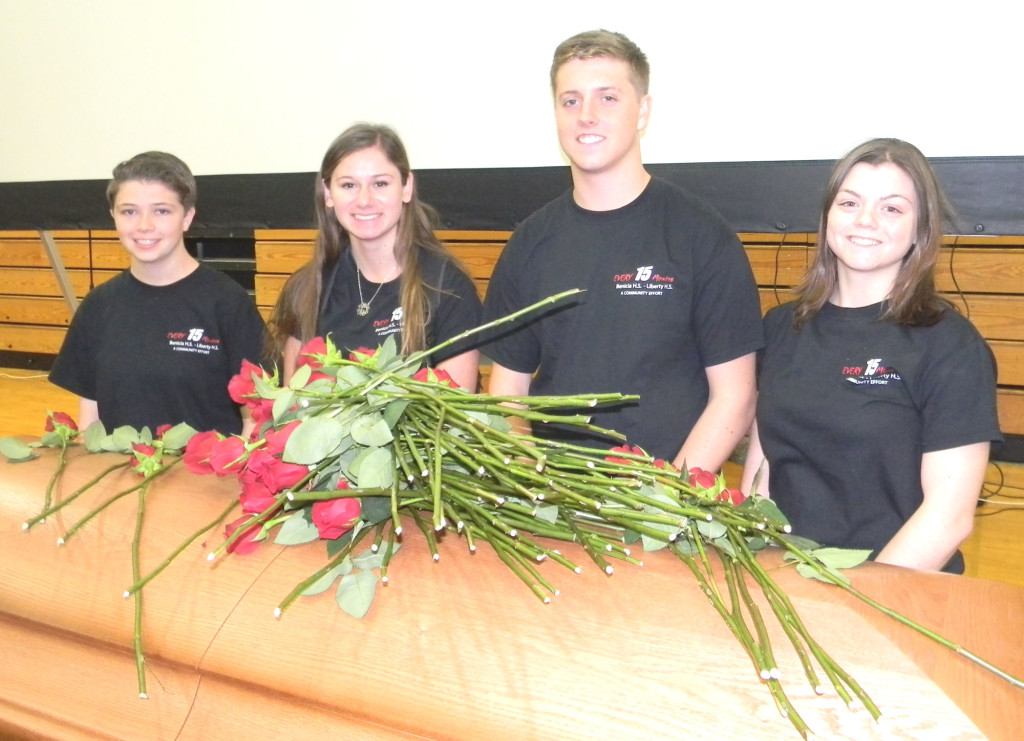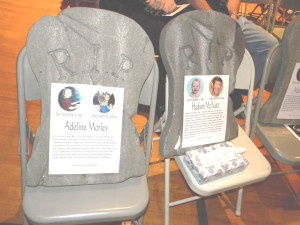
SENIORS (from left) Jessica Rogers, Sabrina Corley, James Mone and Christine Thatcher represented those killed in alcohol-related crashes at an assembly Wednesday.
Photos by Donna Beth Weilenman/Staff
❒ Two-day program gets graphic, emotional in effort to keep students from drunken driving
Elaine DiStephano summed up the emotions she and others felt over their two days’ participation in “Every 15 Minutes,” a program designed to urge Benicia and Liberty high school students to avoid drinking or using drugs and driving.
“You think you can be prepared,” DiStephano said. “Even though it’s fiction.”
But she quickly realized the emotional toll of the simulated death of her son, Antonio, a Benicia High student.
The night before she spoke to an assembly of students, she said, “I woke up every two hours.” She had trouble waiting to see Antonio at school Wednesday.
Though the statistics have improved in recent years, the educational program was named for a time when someone in the U.S. died every 15 minutes in an alcohol-related accident, including drivers, passengers and innocent victims.
The two-day program began Tuesday with the reenactment of a fatal crash. Police officers and their vehicles, firefighters, paramedics, fire trucks, ambulances, simulated bleeding “accident victims,” a California Highway Patrol helicopter and trips to hospitals and a courtroom all added to the realism.
Later, the actors in the portrayal — as well as others called the “living dead” — were separated from their families and classmates in one retreat, while parents attended a retreat of their own.
This year’s program selected 84 students to represent those who have died in drug- and alcohol-related accidents, and Antonio DiStephano was among them. His mother received a notification from a police officer and police chaplain, as if the boy had actually died.
She knew of Antonio’s participation, and had last seen him Tuesday morning, when he got on the bus for school. She also knew she would not see him that night, when parents and students went to separate retreats designed to enhance the realism of losing loved ones after a fatal crash.
DiStephano took the time to write a letter to her son, an assignment all parents taking part in the program were given. She decided to complete her letter during the retreat. “It was the right place to finish it,” she said.
In her letter, she called Tuesday “the worst day of my life. My heart aches for all the times I never experienced.”
Had Antonio actually been killed, she would have missed his graduation, college years and other significant events. “I lost the opportunity to tell you what a remarkable son you have been. I wish I had one more day …”
After Wednesday’s assembly, she reunited with Antonio, another emotional moment. “I get to take him home,” she said with relief.
Mike Palmer, whose son Nathan was another of the “living dead,” told Nathan that he may have gone “overboard” about attending every one of the teen’s games. “My dad never attended my games,” Mike wrote to Nathan. “I have lived our lives through your games.”
 He described getting the call that told him of Nathan’s “death,” and how his mind was full of thoughts as he drove home. “I love you, I love you, I love you,” he wrote the son he praised as “the Lone Ranger” of his Bible study fellowship.
He described getting the call that told him of Nathan’s “death,” and how his mind was full of thoughts as he drove home. “I love you, I love you, I love you,” he wrote the son he praised as “the Lone Ranger” of his Bible study fellowship.
“Living dead” students also wrote their parents. Julia Sapp and Sara Hingley portrayed innocent victims cut down by a drunken driver. “It absolutely amazes me that one thing — one action, one turn of the key, one press of the gas pedal — can change lives,” Julia wrote.
“I didn’t have a chance to say one last goodbye.”
Sara wrote, “All I want to do is be in your arms.” Like Julia, she asked why innocent victims are claimed through others’ poor decisions. She addressed one friend, “I’m sorry I left you so soon.”
Eric Voss apologized not only to his parents but also to his future children. “I wasn’t the only one killed,” he wrote.
He expressed sorrow that his parents would never hold their grandchildren, and that those never-born children wouldn’t meet their grandparents, have a first day of school, “fall in love and have kids of your own. I am truly sorry I couldn’t give you that opportunity, to have a life of your own.”
The cast of Tuesday’s mock fatal crash told their story on video and through their own letters. About 10 Benicia and Liberty students portrayed friends who partied after a prom, then decided to drive at different intervals to a diner. They would collide later in a head-on, high-speed crash.
In the depiction, Michelle Minahen was dead at the scene after being propelled through a windshield. Cassidy Tomsic, riding in a car driven by Autumn Bradley, was airlifted by California Highway Patrol helicopter, but her character died while undergoing treatment for critical injuries. Other students were made up to illustrate serious to minor wounds.
Autumn was placed under arrest, jailed and underwent a court appearance, and her character would be convicted of vehicular manslaughter and sentenced to prison. Her mother, Maria Bradley, was told Tuesday of the fictional account of the accident.
When she met her daughter in jail, she asked, “How many times have we talked about this?” She solemnly advised her daughter, “Your life’s never going to be the same. You hurt a lot of people.”
Autumn composed her own letter, writing, “I took the lives of two beautiful girls.”
On Wednesday, students watched a video replay of Tuesday’s simulated crash scene, which Vice Principal Ron Wheat called “a pretty powerful video, and a great message.” They also watched black-clad classmates, representing the dead, walk in single file, led by Ed Craft, who played “Amazing Grace” on bagpipes. Each took a seat and held a foam tombstones adorned with a photo and obituary.
Students also heard from CHP Chief Paul Fontana, who said despite 1.4 million arrests in 2010 of those suspected of impaired driving, 10,000 lost their lives in crashes involving drivers who had consumed alcohol or drugs.
Putting on the “Every 15 Minutes” program every two years “is very exhausting work,” Benicia Police Chief Andrew Bidou said.
He praised the participating students, saying, “Your involvement makes this program.” and he reminded the assembly, “This is a real problem,” even here, where police arrest a drunken driver about every two days.
Referring to the statistics cited by Fontana, Bidou told students, “We can’t arrest our way out of this. It’s going to be stopped by you.”






Leave a Reply